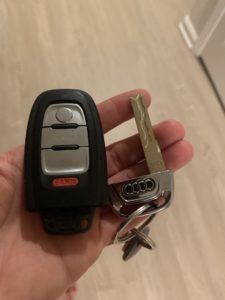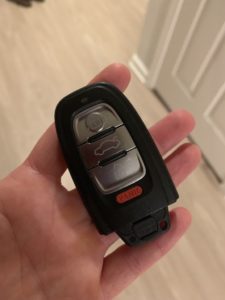The Lockout.
Sunday night I locked myself out of my car in the Target parking lot. It was shortly before 9PM. My bedtime is 9:30PM so that I can wake up at 5:30AM and get a full 8 hours of sleep per night.
Here’s the story. My car’s computer was giving me a message that my key fob needed a new battery, so I swung into Target to get one. My key fob has a little button you can push to remove it from the key that nests inside (see photos). I often do this so that my fob fits in my athletic shorts pocket since I rarely carry a purse.


I went into Target for the battery and two other items. I was in and out within ten minutes, ready to get home and call it a day. While in the store, I removed the battery from the key fob to see what kind of battery I needed to buy, then quickly reinstalled it.
Upon returning to my car, the key fob wouldn’t work. I tried over and over. Opening and closing the battery compartment to make sure I had it in completely. Nothing. I hadn’t realized how close to dead that battery actually was. I walked back into the store to borrow some scissors from the information desk to open the new battery package since my teeth wouldn’t do the trick. With the brand new battery installed, I returned to my car.
Nothing.
I tried several times, opening and closing the battery compartment, tapping the fob against the palm of my other hand in case a wire was loose. Nothing. My first thought was to call an Uber and go home to get my other key fob, but then I realized that I was locked out of my house as well. I called AAA.
I waited. And waited. And waited. Finally, at about 10:15PM, AAA arrived and within five minutes I was in my car and headed home. AAA to the rescue! Again.
Years ago, this situation would have had me seething and stressed beyond measure. Steam would have been coming out my nose and ears. Today, however, while I certainly felt an inconvenience on my time I did not feel stressed or angry. Just an urgency to solve the problem. And a sense of calm knowing that tomorrow, this won’t have mattered.
Our bodies evolved to respond to stressful situations as though they are life-or-death emergencies. But the majority of the stressors in our modern lives, if we stop to think about it, are NOT emergencies.
I have experienced a few major doozies of emergencies during the last couple of years of my life, so I have gained some major perspective on emergency vs non-emergency. That, combined with my daily practices of mindfulness through gratitude and meditation allow me to keep perspective on what is ACTUALLY an emergency and what is just a temporary inconvenience. It’s all about perspective!
Stress is your body’s response to any change in your environment that requires a response by you.
And too much stress is bad for your health, especially when you are not managing it well.
When we are stressed, we release stress hormones leading to a fight or flight response. In the days of our ancestors, this served us well when reacting to dangerous situations such as escaping a wild animal. But in our modern world, stressors are coming at us from all different directions all day every day. We are over-scheduled and overwhelmed. As a result, our brains are responding by telling our adrenal glands to constantly release stress hormones in response to this unrelenting stress, which can be detrimental to our health.
Our energy is greatly impacted by how we deal with (or don’t deal with) the stress in our lives. And serious consequences can result when we don’t deal with stress appropriately. Virtually all chronic health conditions have a stress-related component.
Unrelenting stress can lead to:
🤯 Mental health issues such as depression, anxiety, anger, brain fog
🤯 Obesity
🤯 Hormone imbalances
🤯 Low libido
🤯 Skin issues (rashes, breakouts, etc)
🤯 Gut issues
🤯 Chronic headaches
🤯 Cardiovascular disease
🤯 Autoimmune conditions
The first step to managing stress better, is to identify what the major (and minor) sources of stress are in our lives.
Stress generally comes from a variety of sources, not just one or two. I recommend making a list of ALL the sources that you can think of. For example:
🧩 Dissatisfaction with your job?
🧩 Personal relationships?
🧩 Your commute?
🧩 Kids?
🧩 Finances?
🧩 Saying “yes” too often?
🧩 Food sensitivities?
🧩 Chemical exposure?
🧩 Mold exposure?
🧩 Gut bugs?
🧩 Imbalanced hormones?
🧩 Chronic health issues?
🧩 The health of a loved one?
🧩 Loneliness?
The second step to managing your stress better, improve your health, and prevent chronic conditions in the future is asking yourself:
- Which stressors you can completely eliminate, and what actions you will need to take to eliminate them.
- Which stressors can you minimize by making shifts in the way you do things. For example, one way to minimize your exposure to toxic chemicals is by using products in your home and on your body that are less toxic.
- How you can perceive/manage the stress in your life differently than you already are. This would involve taking up some practices that will help you to respond to stress more appropriately and help you remain in a state of calm, rather than going into a fight or flight response to ordinary non-emergency situations. For example, breath work, mindfulness practices such as gratitude and appreciation, and starting a daily meditation practice…even if only for 5 minutes.
All three of the items listed above are critical components to managing your stress better, which will result in better health and happiness.
Oh, and when installing new batteries in an electronic device, it’s always a good idea to install them right side up. Monday morning, after observing the battery in my extra key fob, I realized that I’d installed the battery upside down. After making that adjustment, it worked perfectly. In addition to observing my improved stress response, I learned a valuable lesson about installing batteries. That’s a mistake I’m unlikely to make twice, and will hopefully save me some time waiting in the Target parking lot in the future.

Great article Tammy, you nail it agin. Absolutely we get stressed in daily basis more than what our bodies can Handel theses days.
Thank you for sharing Your story, It is very helpful.
Thanks for the feedback Ikhlas! I’m so happy to know that it was helpful!